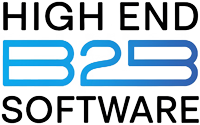Struggling to manage your remote team’s tasks, files, and meetings across time zones? You’re not alone. As more companies embrace remote and hybrid work, having the right project management tool can make or break your productivity. Project management tools for remote teams.
Thankfully, project management tools for remote teams have evolved. No longer just glorified to-do lists, today’s platforms help you align goals, automate workflows, manage files, integrate calendars, and keep everyone on the same page—no matter where they are.
In this article, we’ll explore 7 top-rated project management platforms that are purpose-built for remote collaboration. Whether you’re leading a startup, scaling an agency, or running a distributed SaaS team, there’s a solution here to match your workflow and budget. Project management tools for remote teams.
Heads up: This post contains affiliate links. If you grab something through them, I might earn a small commission — at no extra cost to you.
1. ClickUp – Best All-in-One Workspace for Remote Teams
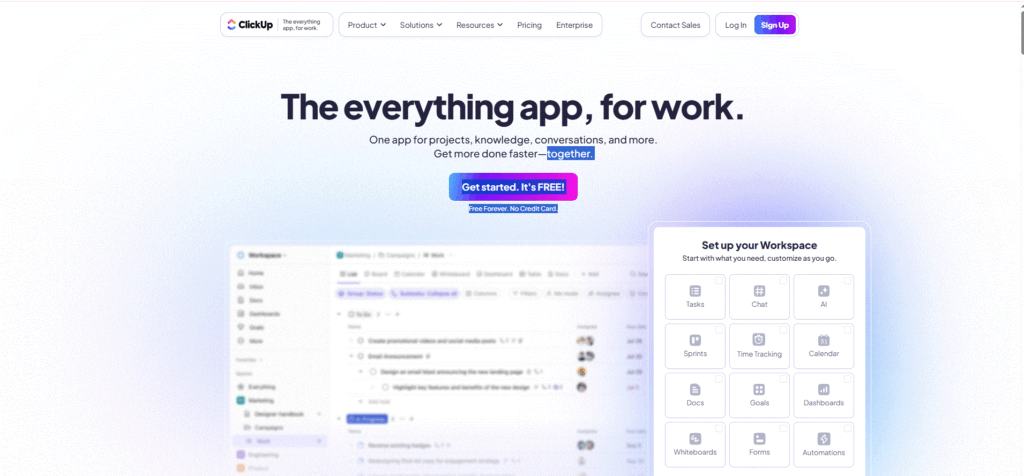
Official Site: Visit ClickUp
If you’re running a fast-moving remote business, ClickUp is a powerhouse. It combines task management, docs, goals, time tracking, and team chat—all in one customizable dashboard. Project management tools for remote teams. With robust templates and views like Kanban, List, Calendar, and Gantt, ClickUp fits everything from agile sprints to creative workflows.
Key Features & Benefits:
- All-in-one workspace (Tasks, Docs, Chat, Goals)
- 15+ views (Board, List, Gantt, Timeline, Calendar)
- Real-time collaboration for remote teams
- Native integrations with Slack, Zoom, Google Drive, and more
- Custom fields, automation rules, recurring tasks
Pros:
- Extremely flexible and scalable
- Robust free plan with automations
- Mobile + desktop apps are intuitive and fast
- Pre-built templates for marketing, engineering, CRM, etc.
Cons:
- Initial learning curve for new users
- Too many features can overwhelm small teams if not tailored
Best For: Remote SaaS teams, agencies, and startups that want an all-in-one project operating system.
2. Monday.com – Visual Work OS for Organized Remote Collaboration
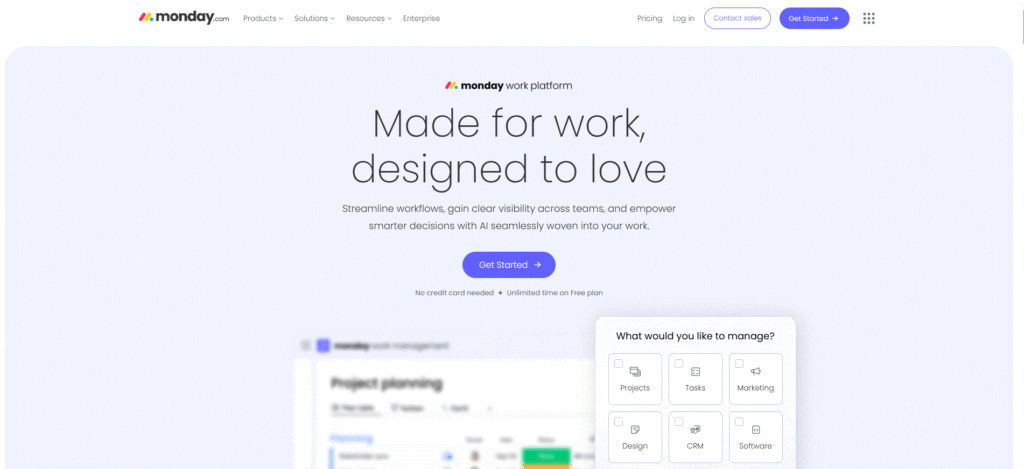
Official Site: Visit Monday.com
If your team thrives on visual clarity, Monday.com is a remote-friendly project management platform that feels more like a dynamic operating system. Project management tools for remote teams. It lets you manage everything from task pipelines and marketing campaigns to product launches using highly customizable boards and color-coded automations.
From solopreneurs to enterprise agencies, Monday’s flexibility makes it a top pick for organizing remote teams and aligning priorities in real-time—even across time zones. Project management tools for remote teams.
Key Features & Benefits:
- Drag-and-drop boards, timelines, Gantt, and Kanban views
- 200+ pre-built templates for marketing, dev, HR, etc.
- Automate repetitive tasks (e.g., move items, notify team)
- Seamless integrations: Zoom, Slack, Gmail, Microsoft Teams
- Real-time updates and team mentions
Pros:
- Super clean interface and easy to set up
- Highly customizable workflows for any team
- Mobile app works beautifully for remote use
- Great visualization for timelines and deadlines
Cons:
- Pricing can rise quickly as your team scales
- Some learning curve for deeper automation features
Best For: Remote agencies, marketing teams, and cross-functional teams that need visibility and structure.
3. Asana – Task Management Built for Remote Teams

Official Site: Visit Asana
Asana is a beloved name in the project management world, especially among remote-first teams. Its clean interface and intuitive task organization help distributed teams plan, execute, and track everything—from weekly sprints to company-wide goals. Whether you’re a small marketing team or a fast-scaling startup, Asana makes collaboration structured and transparent.
It’s not just a to-do list—it’s a full work management system that allows for dependencies, project timelines, portfolios, and robust reporting.
Key Features & Benefits:
- Task assignments with due dates, subtasks, and priorities
- Multiple views: List, Board, Calendar, Timeline
- Workflow automation (rule-based triggers, form submissions)
- Custom fields for tagging projects by department, stage, or team
- Integrates with Slack, Zoom, Dropbox, Notion, HubSpot & more
Pros:
- Simple UX that scales with team complexity
- Excellent mobile app for async collaboration
- Notifications and task dependencies keep everyone accountable
- Free plan is generous for small remote teams
Cons:
- Gantt charts and reporting tools require a premium plan
- No built-in time tracking (requires integration)
Best For: Remote startup teams, agencies, and anyone looking to streamline project tracking without tech overload.
4. Notion – The Ultimate Blend of Docs, Tasks, and Collaboration
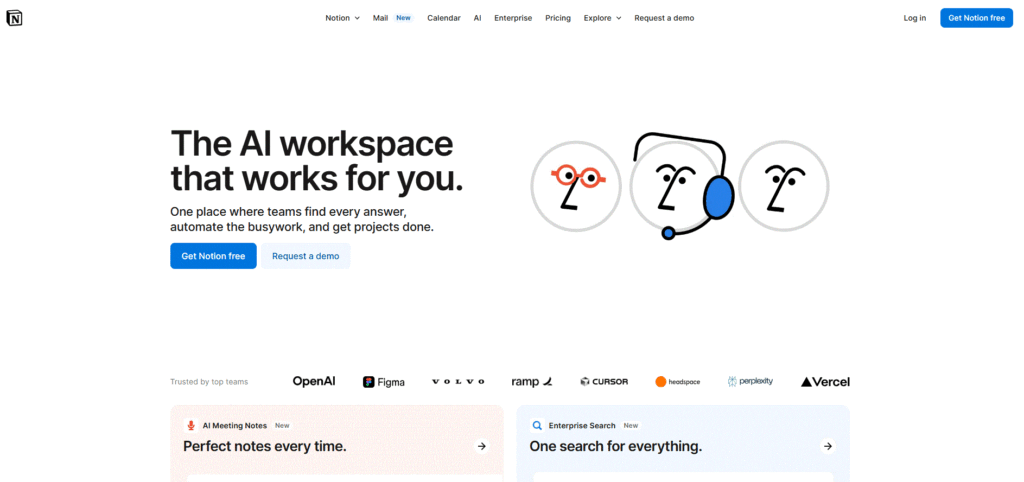
Official Site: Visit Notion
Notion has become a favorite among startups, creatives, and remote-first teams because of its modular, drag-and-drop workspace. It lets you build anything from task boards to wikis, project dashboards, and team knowledge bases—all within a beautifully minimal UI.
If you’re managing remote workflows that involve documentation, task tracking, and collaboration, Notion makes it fun, visual, and powerful.
Key Features & Benefits:
- All-in-one workspace: docs, tasks, databases, calendars, and embeds
- Real-time collaboration, comments, and mentions
- Dozens of built-in templates for teams, product management, HR, and more
- Works across devices with seamless syncing
- Integrates with Slack, GitHub, Google Calendar, Zoom, and more
Pros:
- Fully customizable layout and database views
- Great for building internal wikis, SOPs, and team hubs
- Excellent community support and templates
- Mobile app is surprisingly robust
Cons:
- Lacks some advanced task automation compared to ClickUp or Asana
- Requires time to set up for large teams
- Offline mode can be limiting
Best For: Remote teams needing a flexible system for docs + project tracking in one place.
5. Trello – The Kanban Simplicity That Just Works
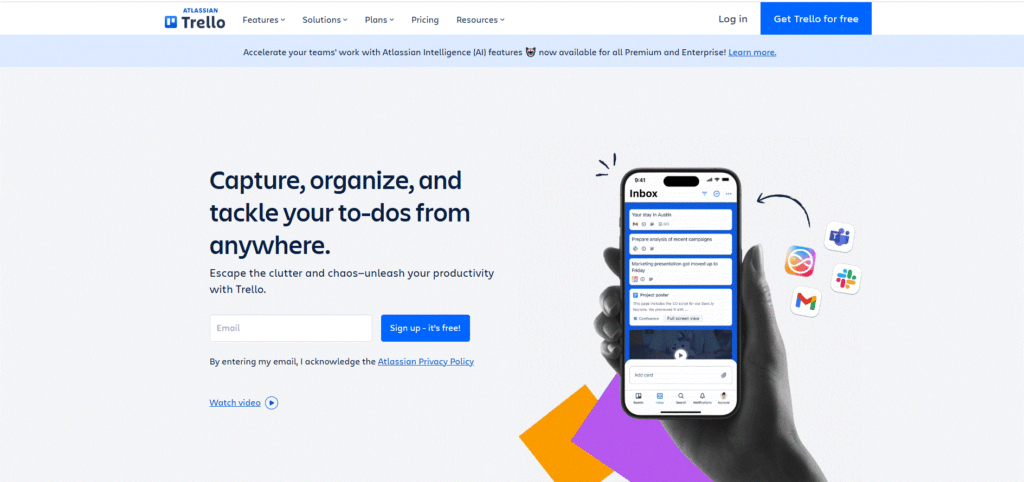
Official Site: Visit Trello
Trello remains a favorite for remote teams looking for a visual, intuitive, and lightweight way to manage projects. Based on the Kanban methodology, Trello lets you organize tasks into boards, lists, and cards—making it perfect for teams that value clarity and ease over complexity.
Whether you’re tracking marketing campaigns, editorial calendars, or sprint workflows, Trello keeps everything accessible, collaborative, and easy to manage.
Key Features & Benefits:
- Drag-and-drop card-based Kanban interface
- Power-Ups (integrations) for Slack, Jira, Google Drive, Zoom, and more
- Automations using Butler (no-code rule builder)
- Commenting, file attachments, and checklists built into each card
- Desktop, mobile, and browser access
Pros:
- Extremely easy to onboard and adopt
- Visual task tracking that’s great for remote stand-ups
- Free plan is surprisingly generous
- Clean UX with great mobile support
Cons:
- Lacks deep project analytics or reporting
- Limited for complex project structures without Power-Ups
- Scaling requires upgrade and integrations
Best For: Small remote teams and freelancers who want visual simplicity and quick setup.
6. Teamwork – Built for Client Projects and Remote Collaboration
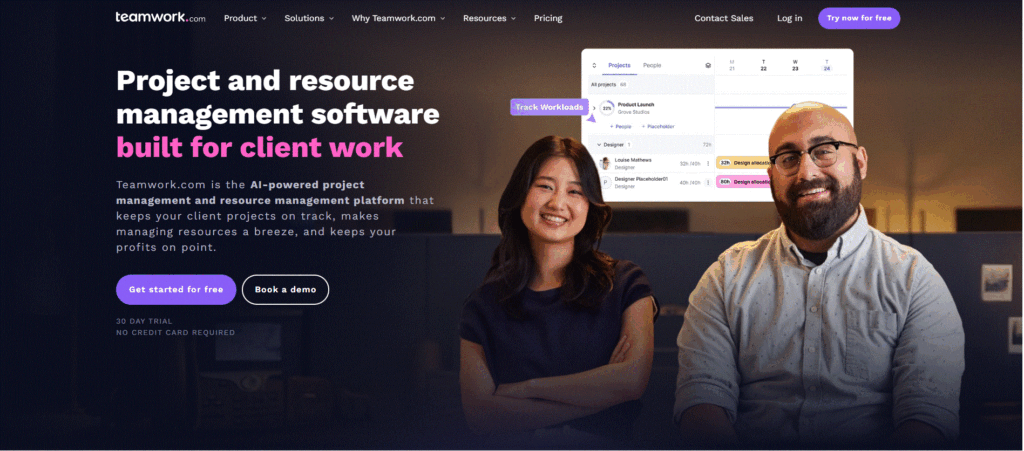
Official Site: Visit Teamwork
If you run a remote agency or service-based business, Teamwork is designed with your workflow in mind. It goes beyond task management by integrating client billing, time tracking, and workload management—all under one roof. This makes it a strong pick for remote teams juggling multiple client accounts.
It’s especially useful for remote creatives, consultants, and marketers who want clarity over client tasks, timelines, and responsibilities.
Key Features & Benefits:
- Full-featured time tracking and invoicing
- Gantt charts, milestones, and project templates
- Client-facing tools for collaboration and feedback
- Workload planner and team capacity management
- Integrations with HubSpot, Google Drive, Slack, Microsoft Teams
Pros:
- Built specifically for client services and remote agencies
- Transparent task assignments with timelines
- All-in-one for tracking, managing, and billing projects
- User permissions and client roles make collaboration secure
Cons:
- Takes time to configure for large projects
- Interface isn’t as modern as ClickUp or Asana
- Fewer third-party add-ons than bigger platforms
Best For: Remote agencies and service teams managing multiple clients and billable hours.
Feature Comparison Table
| Feature | Details | My Take |
|---|---|---|
| Interface & Ease of Use | Clean, intuitive dashboards with drag & drop tools | Smooth UX for distributed B2B teams |
| Integrations | Connects with Slack, Zoom, Google Drive, Zapier | Seamlessly fits into remote workflows |
| Pricing | Starts at free plans; premium from $5–$12/user | Great value with generous free tiers |
| Customization | API access, widgets, custom workflows | Ideal for startups and growing teams |
| Best For | Remote SaaS, agencies, ecommerce, marketing teams | Especially built for async collaboration |
(FAQ) For project management tools for remote teams
What is the best project management tool for remote teams?
ClickUp and Asana are widely recommended for remote teams because they combine task management, time tracking, communication, and automation—all in one platform.
Are there free project management tools for small remote teams?
Yes! Tools like Trello, ClickUp, and Asana offer free plans with generous limits that work well for startups and freelancers.
What should I look for in remote team software?
Look for tools with collaboration features, cloud syncing, integrations, mobile access, and real-time updates—especially if you’re managing multiple time zones.
Can I manage clients and billing inside a project management tool?
Absolutely. Tools like Teamwork and Wrike offer built-in time tracking, invoicing, and client access control features for smooth remote client handling.
Final Thoughts
Choosing the right project management software for remote teams isn’t just about features—it’s about flow, communication, and transparency. Whether you’re managing a distributed SaaS startup or a growing remote agency, the tools listed above are all proven solutions trusted by real businesses in 2025.
From the versatility of ClickUp and simplicity of Trello, to the client-centric design of Teamwork, each platform shines in different ways. Your choice should align with your team’s size, style, and long-term growth goals. project management tools for remote teams.
The best part? You can try most of these tools for free—so explore a few, test them with your team, and double down on the one that removes friction from your daily workflow.
“This post contains affiliate links. If you grab something through them, I may earn a small commission — at no extra cost to you.”
Related Article: Best No-Code Automation Platforms for Small Business
